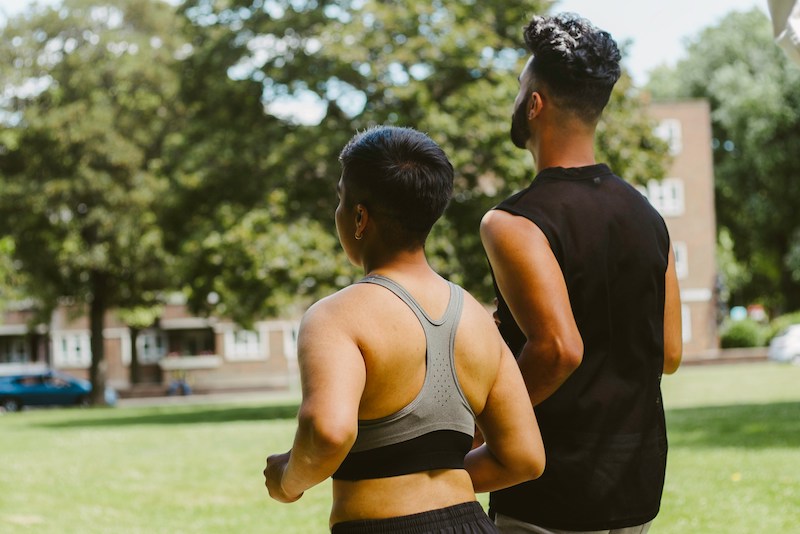Foods for improving testosterone: do any work? We asked a dietitian

If your testosterone levels are lower than they should be, it can leave you feeling a bit rubbish.
Whether you want to get back to your old self or simply want to optimise your physical performance, you may be wondering whether there are any natural ways to improve your testosterone production.
And specifically, you may be asking: can I raise my testosterone levels with food?
There’s a lot of misinformation about the link between diet and testosterone, so we consulted Mei Wan, a registered dietitian and nutritionist, to help us sort fact from fiction. Mei is also an expert in weight loss and type 2 diabetes remission, so she's the perfect expert to consult with on this topic.
Can you boost your natural testosterone levels with food?

“The short answer is yes, you can improve your natural testosterone levels by adjusting your diet – particularly if you don’t have a great diet to start with, or you’re lacking in key vitamins and minerals. But there’s no single ‘magic’ food or diet plan; it’s more about building in key nutrients, and generally taking good care of yourself.” – Mei Wan, Dietitian & Nutritionist
There is a clear, well-documented link between even moderate obesity and low testosterone.
Low levels of testosterone affect body composition, which can lead to an increase in body fat, and in turn become a vicious cycle.
So naturally, following a nutritious and balanced diet is likely to promote natural testosterone production.
And that word ‘balance’ is important, by the way: extremes aren’t recommended, even when they might appear to be healthy. Previous studies have shown that following a strict very low carb, very high protein or low fat, high fibre diet may negatively affect testosterone levels.
Which minerals to prioritise for testosterone production
We all know we should be eating a ‘good, balanced diet’. But are there some specific types of food you can include to improve testosterone levels?
There hasn’t been a huge amount of research done into this, and more is needed to confirm early results. But studies have shown a positive correlation between good levels of the following vitamins/minerals and testosterone levels.
Ted’s Tip: Where the vitamins and minerals are concerned, it’s worth noting that you’ll only really feel the benefit if your diet is currently deficient or insufficient; doubling your recommended daily dose of zinc, for example, won’t help. If you’re unsure, it’s always worth checking with a healthcare professional before taking supplements.
1. Zinc
The role it plays in the body: Helps in developing sex organs, sperm cell production, and the making of hormones (including testosterone).
Scientific link to testosterone: “We concluded that zinc deficiency reduces testosterone levels and zinc supplementation improves testosterone levels.”
2. Magnesium
The role it plays in the body: Helps with skeletal muscular development and maintenance, and improves metabolism, among other important roles.
Scientific link to testosterone: “There is evidence that magnesium exerts a positive influence on anabolic hormonal status, including Testosterone, in men.”
3. Vitamin D
The role it plays in the body: Vitamin D helps keep bones, muscles and teeth healthy, but also supports across a number of other areas in the body – including male fertility.
Scientific link to testosterone: “The effects of vitamin D supplementation on testosterone levels were inconclusive, with limited evidence of significant changes in total testosterone. However, potential influences on sex hormone-binding globulin and free testosterone levels were observed.”
8 Foods that may support testosterone production
Each of the following foods is rich in one or more of the vitamins and minerals above, or contains a good level of healthy fats. And many come with other side benefits for testosterone production, too:
1. Eggs
Eggs (in particular egg yolks) are a rich source of Vitamin D. The correlation between vitamin D and testosterone is still a bit of a grey area. But some studies do indicate that vitamin D can positively influence your levels of free testosterone and sex hormone-binding globulin – both of which are a helpful start for increasing testosterone production.
And given most British people struggle to get the vitamin D they need from sunshine alone (especially in autumn and winter), it might be worth considering adding a few more eggs to your weekly meal plan.
2. Broccoli, kale and brussel sprouts
Eating a variety of plant foods is key to general health. But cruciferous vegetables (including many leafy greens, brussel sprouts, and broccoli) contain higher levels of compounds called glucosinolates, which can help balance estrogen levels, indirectly supporting testosterone production.
3. Brazil nuts
Brazil nuts contain very high quantities of selenium – you only need to eat around two Brazil nuts to get to your recommended daily intake. Studies have found that getting enough selenium can improve testosterone levels and may improve semen quality, too.
4. Pomegranates
Pomegranates have long been a symbol of fertility. But is there any truth to that claim? Some (small) studies have found a link between drinking pomegranate juice and having higher testosterone levels.
Pomegranate juice is rich in antioxidants and has anti-inflammatory properties. Studies have found that it may help to lower stress and high blood pressure, which are both factors that can negatively impact testosterone production.
5. Fish
Rich in both omega-3 polyunsaturated fatty acids and vitamin D, eating fatty fish comes with a whole host of health benefits that may indirectly help to improve testosterone production.
And there’s more: a recent study found that a higher intake of total fish, particularly lean fish, was associated with higher serum testosterone levels, particularly for older males.
6. Lean meat
Lean meat, particularly red meat, has some of the highest levels of zinc of any food.
(Technically, the most zinc-rich food is oysters – but we guess these might not feature regularly in the average meal plan!)
If you’d prefer vegetarian alternatives, there are plenty of zinc-rich options; nuts, lentils, seeds, and tofu are all good places to start – but it’s worth noting that this isn’t a simple swap. Plant-based foods contain lower levels of zinc, so you need to eat them in larger quantities to get the same amount of zinc as a meat-eater.\
7. Spinach and Swiss chard
Leafy vegetables, including spinach, Swiss chard, and kale, have high levels of magnesium. Studies have shown a positive link between a good magnesium intake and higher testosterone levels, so if you needed a nudge to eat your greens – this is it!
8. Avocados
In testosterone terms, avocados have the potential to be a great all-rounder; they contain monounsaturated fats, and are also a good source of magnesium and zinc.
Types of food to avoid or eat less of
Incorporating some of the foods above is a great start to improving your overall health, and hopefully improving your testosterone levels.
At the same time, it’s worth dialling down some of the following food types, which have been shown to negatively impact testosterone production – either directly, or through their well-documented links to obesity.
Try to cut back on the following types of food:
- Fried, fatty foods
- High sugar foods
- Ultra-processed foods
Changing your lifestyle is a great start – but it isn’t always enough
If you suspect you have low testosterone levels, eating a more balanced diet and getting regular exercise is a great place to start.
But depending on your current lifestyle and your natural testosterone levels, it may not provide enough of a boost to get your testosterone levels within the optimal range for your age, and to get you feeling your best.
A simple blood test is the first step to working out your natural testosterone levels, and determining the best course of action. Testosterone replacement therapy (TRT) is a scientifically proven, UK-licensed option for topping up your natural testosterone production with injections, creams, or pills.
After taking a blood test, our specialist consultants can talk through your options. Even with TRT, we still recommend making lifestyle adjustments when needed to give yourself the best chance of increasing your testosterone naturally.
FAQs
Can you take supplements instead?
While it’s always better to hit your recommended daily allowance through diet, this isn’t always easy, and supplements can help fill this gap. The NHS actually recommends that people in the UK take a vitamin D supplement during autumn and winter; we get much of our vitamin D from sunshine, so it can be hard to reach our recommended quota in the UK.
It’s also worth noting that studies tracking the link between a vitamin or mineral and testosterone levels generally use supplements, as this is the most accurate way to track the change.
Do raw onions increase testosterone?
A study found that taxifolin, a flavonoid compound found in red onions, did have a positive impact on testosterone levels. However, this study was carried out on rats – so the jury’s still out on this one!
Let’s take a look under the hood
Take your health into your hands. Order your blood test & 30-minute doctor consultation today.
.png)
Let’s check where you’re at
“It’s about ruling things out. Discreet, easy, straightforward… so why not? You’d be crazy not to check.” – Sir Steve Redgrave
.png)




